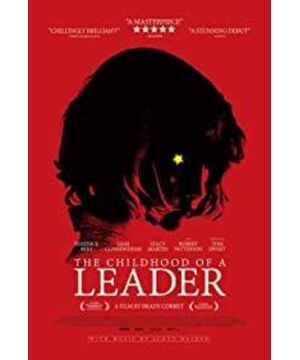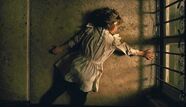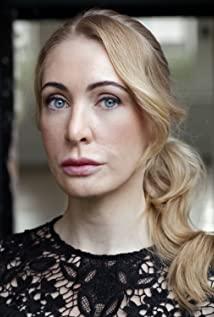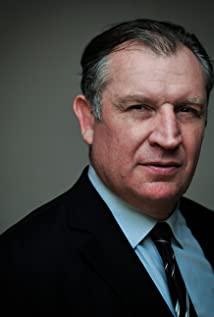How to watch this movie: Does it present a generalized pre-war consciousness, or is it just a specific story set in a special period? If it is the former, then everything must be regarded as symbols. The boy is a symbol, and he is the budding state of political terror. This kind of seeing the big from the small, seems to explain a lot in general, but it also misses a lot. And I prefer the latter, because there is actually no stacking of symbols in the movie, and the meaning of each element is specific and sensible. The movie itself has provided all the dramatic elements required for the character to be automatically completed. It does not rely on generalization at all, nor does it require our meager background knowledge. This is almost perfect. The following are all spoilers———————————————————————— Background: The end of World War I • Wilson’s "Fourteen Points Principle" • The father of the Paris Peace Conference is the US Secretary of State Assistant, working in Wilson's team, followed the delegation to France to arrange post-war affairs. Family members are generally not allowed, but because the wife can speak fluent French (and the assistant secretary of state can't speak a word of French), the family goes to Europe with the host. The situation in France at the time was that there were not a few houses still standing on the ground, and none of the standing houses were painted with ugly white paint (to cover bullet holes and burn marks). The family lived in a big and dilapidated mansion (what happened to the former master), the places where you can go for a walk are too barren to catch ghosts. The peasant woman who happened on the road was too poor to feed her children. The defeated country was devastated. The host chatted with a colleague of the German delegation (Pattinson, who seemed to be a British or American with German citizenship), and said that there are many Muslims in Paris. Many people throughout Europe have become Muslims. The First World War severely damaged faith in God. The Germans seem to be cynical, but in fact they are very depressed. The male host has let go of the fake seriousness in front of the Germans (the fate of such a group of people in planning the future of Europe is really worrying...and we also know it). As soon as the German left, the audience knew that his wife had been killed during the war. At the same time, the conversation between the assistant's wife and the German suggested that they had an affair. The gramophone was playing popular songs from the United States, when Hollywood was just born. In this desolate and gloomy French mansion shrouded in an atmosphere of piety, fashionable songs sang endlessly, and expensive small pagan sculptures gleaming (sent from the wife's relatives). Then come to see the little boy. I preconceived that he must feel very lonely when he left his prosperous hometown of New York to come to this place where the birds do not shit and talk strange things. This is indeed the case. When a woman comes to a place, the first thing a woman goes to is the church. The strict mother asked the little boy to pray, learn French, participate in church performances (even if he still can't speak a few French), and be a good boy. The child's performance was poor, and when he was angry, he threw stones at the believers. His long hair reflected a little demon on the window lattice of the church. His mother washed his wounds, changed the sheets for diapers, fulfilled his mother's duties, and deliberately alienated him. She was not with him in his nightmare. The role of mother is very interesting. She comes from an upper-class family in Germany, traveled around the world when she was young, stayed in France, and can speak four languages. When married in the United States, the husband is a very patriarchal person, and he is very traditional in family power issues. She found herself trapped as soon as she got married. She admitted to the tutor that she didn't want children at all. He came to France with her husband out of obedience. Her French is excellent and he would not say at all that her presence would make him look more decent in front of the delegation (appears to know more about European conditions? Whatever); take children to church ceremonies and activities , The first impression she gives is that she is very traditional and conservative, maybe a Catholic. In fact, this is also instinctive obedience (a few of her relatives are already Muslims). Going back to Europe actually has a special meaning to her: out of remorse for her lack of firmness when she was young, eventually getting married, and being tied up by the family as a result, she came to seek roots, seek repentance and forgiveness. The church is to satisfy the formal needs of this psychology. However, the broken homeland, coupled with seasickness and migraine, only aggravated Her depression. The mother's feelings for the little boy can't be said to be unloving, it is simply hate. In the movie, there is a logical chain: the male host is taking advantage of the tutor, and he was bumped into by the child; when the child asked about this when a family of three was eating, his father found a very awkward excuse, and the wife obviously smelled a lie. The smell, but in order to maintain the authority of the male host, helped him to make ends meet; afterwards, the wife figured out what was going on, but she couldn’t do anything to her husband; he had the most power in the family, and he wanted to force her to give birth after finishing the tutoring. child. The hatred for her husband flows down the ladder of power and vents to the son. Torturing children insensitively using religious ceremonies, apologies, etc., is actually out of unconscious revenge. The wife doesn't care about her husband as much as her son. Her whole spirit is remorse for her choice. Even her affair has a sense of remorse-and her fellow countryman, a German. When a child tells a fluent French story (the moral of the story is very suitable: children are of great use) and said that he does not need a tutor and helped his mother drive away his father’s mistress, the mother laughs at having an alliance. . In fact, she was wrong, the little boy had become a 100% purebred demon. The whole experience of the child in France is constantly frustrating. First of all, in this unfamiliar, broken and language barrier environment, what a child needs is care and love, preferably mother's love. Better still, someone should explain to him, why is this place so shabby? Why is the house we live in so weird: Protestant, Catholic, Islamic, fashionable and outdated, American and European, everything? No one will explain. Everyone is busy. Mom said you and God ask for love, I have a headache and can't love it anymore. Pray every day and God will love you. But God doesn't love him either. He wants him to stand at the door of the church like a criminal and say "I'm sorry" to everyone. Then he wanted to have some love with the tutor, but the teacher said no to you that offended me, and in a blink of an eye he saw his father taking advantage of her. The only old cook in the family loves him. This is not bad. She is very kind to him. When punishing him, his parents always help him sloppy, but because of protecting him, the cook was removed from the big run-down house where she stayed for decades. I was driven out from here-there is a high probability that I will become a beggar. No one loves him at all. His mother artificially isolated him from everything that could bring him comfort. As for his father, either ignore him or order him to obey his authority. Others, his father’s colleagues, parishioners, etc., always regarded him as a little girl because of his long hair. In short, everyone didn't pay much attention to him, except when he got into trouble or went crazy. The little boy was like a ghost, wandering among the piles of papers and the busy crowd that were intensively prepared for the Paris Peace Conference. In this environment he was in, there were everything from the old world and the new world, but nothing could help him. They only appeared in his empty nightmare in an inexplicable and terrifying form. The people of those countries and nations under domination do have similarities with the little boys. Just drawing circles on the map will determine their fate for the next few decades. "Bolsheviks...the more "The more you pay in the West"; "What should I do if there are more people of different beliefs in this place?" The delegation shrugged and marked a few plots with a pencil; women's voting rights were stuffed into the agenda, and the men in the conference hall laughed; Wilson, a nerd, froze the relationship with Europe, so Lance’s assistants held a small meeting and said that we might be a little bit more cruel to the defeated country... Standing in the ruins, only extremely naive people would think that one Ideals can control all those new and old hatreds, distorted faces, damaged interests, and continuous troubles and troubles at the practical level. An ideal that is not pure and innocent, it will be poisoned by repeated fear and injury, and grow into a new vision like a poisonous tree. The little boy yelled: "I don't pray any more!" Killing his mother, he fell to death under the stairs while escaping. He is not the phantom of a great dictator. The new demands of everyone in this family (mother and teacher), the outdated hegemony (father), the various rules and beliefs imposed on him, all these intertwined things between the old and the new are only two words for the child-unfamiliar. This is not the feeling of revenge of the victim, but a vague and ominous consciousness-foreseeing that one's own destiny will be arbitrated by forces outside of the control and be branded. The pre-war childhood of the new generation after the war. At the end, the official of the German delegation at the beginning shaved a big bald head and returned to the motherland with the words "weary to the world" on his face. At this time, the local area had fallen into a sort of orderly madness.
View more about The Childhood of a Leader reviews











